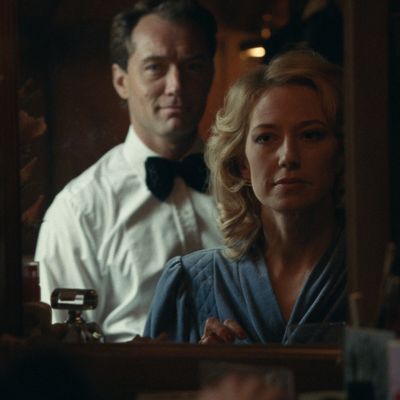
The Nest is a horror movie from which the actual horror’s been drained out, leaving behind only the dread and all the ominous trappings. Like the house that serves as its main location — a cavernous old manor in the Surrey countryside with heavy wood paneling and enough space for a family of four to get lost inside it. There’s nothing supernatural about the place, which, as proud patriarch Rory O’Hara (Jude Law) brags to his wife and children when they first arrive, was once rented by Led Zeppelin when they were working on an album. But there doesn’t really need to be for it to scare the shit out of Benjamin (Charlie Shotwell), the younger of the two kids, who seeks sanctuary with his teenage sister Samantha (Oona Roche) at night until she kicks him out, then sprints through the darkened hallways to his room like something’s going to drag him off into the shadows if he’s not fast enough. And then there’s the horse, which belongs to wife and mother Allison (Carrie Coon), a gorgeous black animal who just isn’t the same after he’s transported from New York to the U.K. As the soundtrack swells with audio of his distress, there’s an ominous zoom in on the half-built structure in which he’s stabled, as though he’s a creature possessed.
As a virtuosic movie about the slow implosion of a familial unit, The Nest doesn’t require the help of hauntings or demonic forces — the call, as they say, is coming from inside the house. It’s coming from Rory, mostly, a fast-talking commodities broker with a taste for luxuries he can’t afford. It’s the ’80s, and Rory, who’s been an Englishman abroad for years, uproots his family and moves them back to the London area after he gets what he describes as a job offer too good to turn down. This turns out to be a lie, which we learn alongside Allison, the camera holding on her frozen face at a party as Rory’s boss, Arthur (Michael Culkin), gives a speech about how his former employee called him up and pitched his services. And yet Allison doesn’t confront Rory, having served as co-conspirator and enabler in her husband’s games for a while now. She doesn’t press him about how much the house cost (“Less than you’d think!” he promises) and she plays along when he tells his co-workers that they own a penthouse in New York and are looking to pick up a pied-à-terre in Mayfair. Rory’s been maintaining this facade for so long that he can’t even be honest with himself about it, but the way that Allison hoards and hides cash hints at how many times they’ve flamed out before.
The Nest is the second feature from filmmaker Sean Durkin, who made a splash back in 2011 with Martha Marcy May Marlene, which launched Elizabeth Olsen’s career via what you could call the title role, as a young woman who’s escaped from a cult that still very much maintains a hold on her mind. Durkin didn’t disappear after that debut — he made the glum 2013 miniseries Southcliffe for Channel 4 in the U.K. — but this follow-up’s been long in coming, and it’s impressive enough to make you wonder why. Durkin has a real skill when it comes to using space, turning the family’s gloomy country house into a warren of doorways and hallways boxing the characters in, and framing the glass-walled office through which Rory prowls as though he were on display at a zoo. Shots like the one of the family clustered at one end of the massive Elizabethan table that came with the house, or trying to make their suburban furniture fit the grandiose space, underscore how poorly they fit this lifestyle without saying a word.
While all four of the family members experience their own personal miseries — Benjamin bullied, Samantha bored and rebellious in her choice of friends — it’s around Allison and Rory that the film really revolves. Coon and Law offer a pair of performances that are among the best of the year, Law leaning into the air of artificiality that can accompany his beauty, and Coon allowing her character’s buried rage to bubble up suddenly in ways Allison herself seems to find bewildering. Sitting at a dinner they can’t afford, the couple play a form of chicken with one another, Allison ordering the most expensive items on the menu, and Rory sneering at her taste in wine. They’re perfectly matched in their bruised magnificence, these two people who’ve been drained by years of pretending to be something they’re not, chasing a dream they couldn’t entirely articulate. As a statement on a decade of consumerism, The Nest doesn’t have anything particularly new to say, but as a fable of familial dysfunction, it’s resonant and, yes, frightening, with nary a ghost in sight.
*A version of this article appears in the September 28, 2020, issue of New York Magazine. Subscribe Now!
More Movie Reviews
- The Thriller Drop Is a Perfect Addition to the Bad-First-Date Canon
- The Accountant 2 Can Not Be Taken Seriously
- Another Simple Favor Is So Fun, Until It Gets So Dumb


